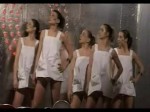As we hear the first lines, we're surprised! The theatre did let us know the performance was in english language, but it appears the french subtiles (that were announced on the program) are, for some technical reason, actually missing....Well, We've all got to adapt, and focus. As watching a danse performance. I remember reading that Orson Wells once said he rather attend a show in a language he didn't knew, to let him fully envoy the playing of the actors... The consistency and musicality of the work of the two actress on stage are indeed attractive. But I am frustrated. I sure miss a great part of the subtility of the play. I've got the feeling to always stay far behinds the meanings, being always to slow, unable to catch all of possible implications. Thanks to Barker's writing style, some words and sentences are often repeated. On the other side, placed into an accurated state on attention, I've to let my imagination work, forced to fill the gaps. Being aware that Barker's theatre can be interprated in many ways. All things considered, It's tonight quite an interesting expérience to live.
In addition, according to Barker's habits, the time and place of the plot are all but explicit. What did I hear, what did I see? It's as confused as the words I use to express it. After a mysterious "alteration", a catastrophe of some kind, they're only two women left on stage (and in the world?): that is a former contess and her servant. Lost in a no man's world, maybe in a no male's world. The relationships betweens these two women seem to be have been reversed, now upside-down. The former servant rules (but the situation is much more twisted than it seems at first glance). She wants her husband to have her former mistress (in a sexual way). The whole play is built on this strange request. But I'm not sure the invisible husband really exists off the stage, maybe he's only the expression of the two women's desire. Of the former servant thurst of social revenge, or of the former mistress secret fears and fantasy. It's no surprise we feel an heavy erotic atmosphère all along. The play deals strongly with social power, desire, dignity, dependence and cruallty. Sometimes a mecanic dogs appears, to claim some contess clothes, have her partly undressed. The dogs is beautifully played by a man, he frighteens the two women, it seems he is send by the husband. I ask myself if the dog could be the husband himself. There is a strong contrast between the elegance of the lines and pronunciation and the violence of their very physical relationships. What the language may be, the two women litteraly fight each other. I enjoy this harscheness. Most interesting, the former contess appears, by her way of speaking, not to be a victim, she dosn't act as submitted. The former servant domination is full of doubts. At last, the former contess disapears off the stage to have forced intercourses with the invisible husband. Or maybe it was just an fantasy. Anyway, she returns form this encounter placed an upper position. The dog nows obeys her, the roles are again reversed. The play could continue in a circular way from now on, with further alterations. Only one thing is sure: the two women need each other. It may have political implication, beyond phsycological meanings. I'm out of words now, so that'll be all, and sorry for the many mistakes. If anybody saw another story he's welcome to tell it.
Howard Barker's Deep wifes, shallow animals , directed by Patrick Vershueren, at Gare au Théatre (cup of theater festival).
lire aussi: Dona Juana
![JVT_7658[1].JPG](http://unsoirouunautre.hautetfort.com/media/02/00/898910155.JPG)
![JVT_8096[2].JPG](http://unsoirouunautre.hautetfort.com/media/02/00/564637502.JPG)
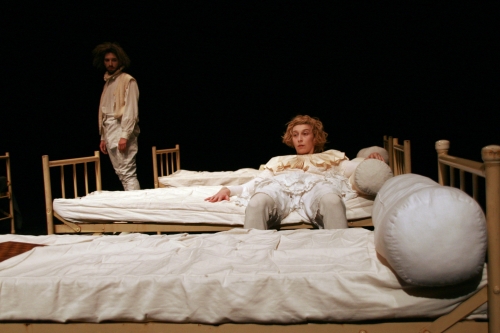
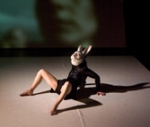 entre les deux, qui bougent comme dans un rêve, toujours éveillé, même souvent agité, avec ses surprises, ses petites angoisses et ses stridences, entendues et dansées. Des séquences d'abord tête basse et bras ballants, puis inquiètes et saccadées, ensuite qui se prolongent en duos monstrueux, courses et poursuites, en rondes endiablées, vers plus de fluidité. Dans cet exercice il y a bien des pieges, mais qui sont évités. La charpente ne se laisse pas deviner, et l'interdit n'est pas dit. L'important est qu'on ne se réveille jamais vraiment, plongé dans l'onirique. Ce n'est plus toujours de la danse et ni du théâtre, non plus. En tout cas d'un humour cru et d'une belle énergie. Pas loin du meilleur de ce qui se situe aux croisements flous d'un voyage halluciné qui dure, dure, de rencontres en rencontres. Les paysages défilent sur l'écran comme les transparences derrière les acteurs des films d'avant, avant qu'y soient proposés des échos du mouvement.
entre les deux, qui bougent comme dans un rêve, toujours éveillé, même souvent agité, avec ses surprises, ses petites angoisses et ses stridences, entendues et dansées. Des séquences d'abord tête basse et bras ballants, puis inquiètes et saccadées, ensuite qui se prolongent en duos monstrueux, courses et poursuites, en rondes endiablées, vers plus de fluidité. Dans cet exercice il y a bien des pieges, mais qui sont évités. La charpente ne se laisse pas deviner, et l'interdit n'est pas dit. L'important est qu'on ne se réveille jamais vraiment, plongé dans l'onirique. Ce n'est plus toujours de la danse et ni du théâtre, non plus. En tout cas d'un humour cru et d'une belle énergie. Pas loin du meilleur de ce qui se situe aux croisements flous d'un voyage halluciné qui dure, dure, de rencontres en rencontres. Les paysages défilent sur l'écran comme les transparences derrière les acteurs des films d'avant, avant qu'y soient proposés des échos du mouvement.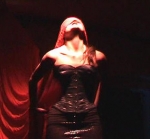 Rigoulot se découvrent l'un l'autre en un duo sensuel et amoureux, Malena Murua fait une avec un rideau de tente et on ne lasse pas de suivre la fébrile
Rigoulot se découvrent l'un l'autre en un duo sensuel et amoureux, Malena Murua fait une avec un rideau de tente et on ne lasse pas de suivre la fébrile 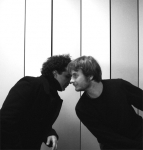 programme. Pourtant ici pas de rocher à pousser, mais sur scène un tas de gravats. Perchée au dessus, la condition humaine, à l'épreuve de sa vérité. Un danseur en costume de ville- Haïm Adri- au corps et la mémoire habités par le foisonnement des danses populaires, le coeur assailli par la surabondance des musiques et des images sonores. Les mains dans la poussière, se saisissant de la matière, cailloux après cailloux, le regard perdu et un peu fou. Pour une heure de course offerte, c'est grave et émouvant.
programme. Pourtant ici pas de rocher à pousser, mais sur scène un tas de gravats. Perchée au dessus, la condition humaine, à l'épreuve de sa vérité. Un danseur en costume de ville- Haïm Adri- au corps et la mémoire habités par le foisonnement des danses populaires, le coeur assailli par la surabondance des musiques et des images sonores. Les mains dans la poussière, se saisissant de la matière, cailloux après cailloux, le regard perdu et un peu fou. Pour une heure de course offerte, c'est grave et émouvant. Certaines se taisent, et ainsi existent d'autant plus, avec force. Avec une évidence subliminale. Telle Aurore Monicard, interprétant
Certaines se taisent, et ainsi existent d'autant plus, avec force. Avec une évidence subliminale. Telle Aurore Monicard, interprétant 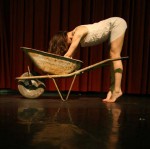 On a d'abord tendu l'oreille pour écouter "Alpe! Alpe! o
On a d'abord tendu l'oreille pour écouter "Alpe! Alpe! o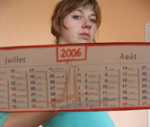 scène pour son projet. Qui consistait à adapter ses journaux intimes écrits depuis l'âge de douze ans. Pour confirmer ce que l'on a pu déjà souvent constater: dés qu'on voit écrit le mot "intime"s'agissant d'un spectacle, ce n'est pas très bon signe. Car, malgré tous nos efforts pour accepter nous aussi la naïveté assumée du concept, moins de vingt quatre heures après avoir entendu un texte de Montherlant, le contraste était cruel.
scène pour son projet. Qui consistait à adapter ses journaux intimes écrits depuis l'âge de douze ans. Pour confirmer ce que l'on a pu déjà souvent constater: dés qu'on voit écrit le mot "intime"s'agissant d'un spectacle, ce n'est pas très bon signe. Car, malgré tous nos efforts pour accepter nous aussi la naïveté assumée du concept, moins de vingt quatre heures après avoir entendu un texte de Montherlant, le contraste était cruel.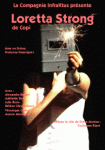 Loretta Strong de Copi (1940-1987),mais au pluriel, en la personne de 6 actrices à la fois, pour saisir ensemble le rôle à bras le corps et l'agiter en tous sens, le répandre sur le plateau membre par membre. En une folie démultipliée, en une hystérie croissante, version cours de récréation après que les enfants aient étranglé les surveillants, pour nous faire partager une heure de terrible régression.
Loretta Strong de Copi (1940-1987),mais au pluriel, en la personne de 6 actrices à la fois, pour saisir ensemble le rôle à bras le corps et l'agiter en tous sens, le répandre sur le plateau membre par membre. En une folie démultipliée, en une hystérie croissante, version cours de récréation après que les enfants aient étranglé les surveillants, pour nous faire partager une heure de terrible régression.